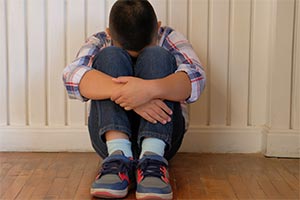Page Image
Page Content
“What to Do or Say When Your Child Says” Series:
Kids, especially teens and tweens, know exactly what to say to get under your skin, worry you or even downright hurt your feelings! But hey, who’s the adult here? You are! So, before you find yourself in an argument that ends in your child blurting out one of the following whoppers, take a few minutes and peruse the Your Life Your Voice articles that are attached to each of these common kid comments.
Sure, Your Life Your Voice is written to reach out to tweens and teens, but the coping skills we teach work for everyone! So, the next time your kids throw out a whopper like “I hate you,” a challenge like “You can’t make me” or every parent’s biggest fear “I want to end my life,” make sure you have this series saved so you can do some quick research and defuse the situation. (Better yet, look at the resources as the series progresses and be ready at a moment’s notice to offer the best response possible under whatever circumstances you find yourself facing.)
1. “I hate you!”
 Chances are you’ll hear this one at least once in your life. It may be a momentary reaction to restrictions or simply a shot at making you see red. Either way, you should have a plan on how to manage your own anger, before what’s a bad situation gets a whole lot worse (like saying something you can’t take back.)
Chances are you’ll hear this one at least once in your life. It may be a momentary reaction to restrictions or simply a shot at making you see red. Either way, you should have a plan on how to manage your own anger, before what’s a bad situation gets a whole lot worse (like saying something you can’t take back.)
2. “I want a different mom/dad.”
 And right now, you’re choking on the words, “I wish I had a different child,” DON’T DO IT! You are the adult here and if there’s going to be progress toward changing hearts and minds, you’ll have to be the one to build that bridge. So, take a deep breath and read our article about building bridges instead of walls. You’ll be glad you did.
And right now, you’re choking on the words, “I wish I had a different child,” DON’T DO IT! You are the adult here and if there’s going to be progress toward changing hearts and minds, you’ll have to be the one to build that bridge. So, take a deep breath and read our article about building bridges instead of walls. You’ll be glad you did.
3. “You don’t care about me.”
 Nothing frustrates parents more than this statement from a child you not only care about but love deeply. Just remember, the tween and teen years are times of great emotional growth and upheaval. When your child feels like nobody cares, a little empathy will go a long way toward understanding instead of reacting.
Nothing frustrates parents more than this statement from a child you not only care about but love deeply. Just remember, the tween and teen years are times of great emotional growth and upheaval. When your child feels like nobody cares, a little empathy will go a long way toward understanding instead of reacting.
4. “No one loves me. (No one cares about me).”
 This is always heartbreaking to hear. But before you encounter it, it might be best to mentally have a list of all the ways you show you love your child. You don’t necessarily need to list them at that moment, but you won’t fall into the “poor me” trap either. These articles on stopping negative thoughts and letting go of negative feelings might be something you can direct your child to when they’ve calmed down a bit.
This is always heartbreaking to hear. But before you encounter it, it might be best to mentally have a list of all the ways you show you love your child. You don’t necessarily need to list them at that moment, but you won’t fall into the “poor me” trap either. These articles on stopping negative thoughts and letting go of negative feelings might be something you can direct your child to when they’ve calmed down a bit.
5. “You wouldn’t understand.”
 Ah yes, because you were never a tween or teen, right? You do understand, but with layers of wisdom added on that your child may not wish to acknowledge. That’s okay. But be careful not to play the “know it all,” because many things have changed since you were a kid, and your child may not be 100% wrong. Perhaps a break in the conversation and some research on your part would go a long way. Check out Your Life Your Voice for a quick survey of the challenges facing kids today.
Ah yes, because you were never a tween or teen, right? You do understand, but with layers of wisdom added on that your child may not wish to acknowledge. That’s okay. But be careful not to play the “know it all,” because many things have changed since you were a kid, and your child may not be 100% wrong. Perhaps a break in the conversation and some research on your part would go a long way. Check out Your Life Your Voice for a quick survey of the challenges facing kids today.
6. “You can’t make me!”
 Truer words were never spoken. Once kids are tweens and teens, you really can’t MAKE them do anything. You could make them sit at the table, but you can’t make them learn the math. You can force them to go to practice, but you can’t make them work hard. Maybe it’s time to turn this conversation on its head and help them realize they need to MAKE THEMSELVES do the important things in life. Read this great article from Your Voice Your Life and then pass it along to your kid when the time is right.
Truer words were never spoken. Once kids are tweens and teens, you really can’t MAKE them do anything. You could make them sit at the table, but you can’t make them learn the math. You can force them to go to practice, but you can’t make them work hard. Maybe it’s time to turn this conversation on its head and help them realize they need to MAKE THEMSELVES do the important things in life. Read this great article from Your Voice Your Life and then pass it along to your kid when the time is right.
7. “I hate myself.”
 This is a tricky one…because you can’t change how someone feels about themselves. If you honestly think your child means this one, it might be time for some counseling sessions. But in place of that, you can certainly share the articles listed below with your child. They are listed in the order that they should be read, as they build upon the child’s journey into bolstering their self-esteem.
This is a tricky one…because you can’t change how someone feels about themselves. If you honestly think your child means this one, it might be time for some counseling sessions. But in place of that, you can certainly share the articles listed below with your child. They are listed in the order that they should be read, as they build upon the child’s journey into bolstering their self-esteem.
8. “I’m worried.”
 Worry. It’s part of adulting. However, kids who experience excessive worry tend to start avoiding the social situations and activities about which they are worried. Remember, with their still-developing brains, many emotions seem BIGGER than they are for teens and even young adults. Helping them learn to put their worries into perspective creates happier teens and better-adjusted adults. Take a look at the articles below today and have the suggested ideas stored in your brain for the next “I’m worried” conversation with your child.
Worry. It’s part of adulting. However, kids who experience excessive worry tend to start avoiding the social situations and activities about which they are worried. Remember, with their still-developing brains, many emotions seem BIGGER than they are for teens and even young adults. Helping them learn to put their worries into perspective creates happier teens and better-adjusted adults. Take a look at the articles below today and have the suggested ideas stored in your brain for the next “I’m worried” conversation with your child.
9. “I’m sad.”
 First point, even if you think the thing they are sad about is silly, EMPATHY first. Kids can feel deeply about things you understand and things that make no sense to you. It doesn’t matter. If your child is sad you need to be listening and offering support so that they don’t feel alone in their sadness. If talking about feelings is hard for you, read the articles below today and be better prepared for the next emotional conversation that comes along.
First point, even if you think the thing they are sad about is silly, EMPATHY first. Kids can feel deeply about things you understand and things that make no sense to you. It doesn’t matter. If your child is sad you need to be listening and offering support so that they don’t feel alone in their sadness. If talking about feelings is hard for you, read the articles below today and be better prepared for the next emotional conversation that comes along.
10. “I want to hurt myself.”
 Take a deep breath and don’t panic. Self-harm, or “cutting” as it’s often called, is not the same thing as attempting to commit suicide. Though to a parent looking at this phenomenon for the first time that may be hard to remember. The articles below are a great resource to read before you talk to your child about what you have noticed. If you don’t feel comfortable talking to them and need some expert advice on how to best handle your specific situation, call the Boys Town Hotline to talk with our Crisis Counselors who are well-versed in this phenomenon. They can help you determine the next best action and provide you with appropriate community resources.
Take a deep breath and don’t panic. Self-harm, or “cutting” as it’s often called, is not the same thing as attempting to commit suicide. Though to a parent looking at this phenomenon for the first time that may be hard to remember. The articles below are a great resource to read before you talk to your child about what you have noticed. If you don’t feel comfortable talking to them and need some expert advice on how to best handle your specific situation, call the Boys Town Hotline to talk with our Crisis Counselors who are well-versed in this phenomenon. They can help you determine the next best action and provide you with appropriate community resources.
